Table of Contents
Summary
Preventing dental implant complications requires a combination of good oral hygiene, careful planning, and the use of high-quality, sterilized surgical instruments. Key steps include:
- Maintaining a healthy mouth before the procedure
- Choosing an experienced dentist and reputable facility
- Following post-surgical care instructions closely
- Avoiding smoking and adopting a healthy lifestyle
- Regularly visiting your dentist for checkups
By following these steps, patients can reduce the risk of infection, implant failure, nerve or sinus complications, and ensure long-term success for their dental implants. High-quality surgical instruments and strict hygiene protocols are essential at every stage, from surgery to recovery.
Introduction
Dental implants are one of the most effective ways to replace missing teeth and restore your smile. They look, feel, and function like natural teeth, making them a popular choice for patients worldwide. However, like any surgical procedure, dental implants carry some risks and potential complications. These can include infection, implant failure, nerve damage, sinus problems, or issues with the restoration itself.
The good news is that most of these complications can be prevented with proper care, careful planning, and regular follow-ups with your dentist. Understanding the causes of implant problems and taking proactive steps before, during, and after the procedure is essential for long-term success.
In this guide, we’ll walk you through the most important tips to prevent dental implant complications, from maintaining excellent oral hygiene to choosing the right dental professional and ensuring proper healing. By following these steps, you can protect your implants, avoid common problems, and enjoy a healthy, confident smile for years to come.
Understanding Dental Implant Complications
Dental implants are highly successful when performed correctly, but complications can still arise if proper hygiene and surgical protocols are not followed. Understanding these risks helps patients and dental professionals take proactive steps to prevent them.
Common Complications
- Infection (Peri-implantitis) – One of the most frequent complications, infections can occur around the implant site if bacteria enter the wound. Maintaining oral hygiene and using sterilized surgical instruments are critical to reduce this risk.
- Implant Failure – Failure can happen due to poor bone integration, improper placement, or uncontrolled infection. Using high-quality surgical tools ensures precision during the procedure and reduces the chance of errors.
- Nerve Damage – Accidental injury to nerves during implant placement can cause numbness, tingling, or pain. Accurate surgical instruments and careful planning are essential to minimize this risk.
- Sinus Complications – Implants in the upper jaw can affect the sinus cavity if not placed correctly. Proper instruments and surgical techniques help prevent these issues.
Prosthetic Issues – Problems with the crown or restoration, such as loosening or misalignment, can affect the implant’s longevity. High-quality instruments and precise placement contribute to better prosthetic outcomes.
Causes of Implant Failure
- Poor Oral Hygiene – Bacteria accumulation can lead to infections and delayed healing. Regular cleaning and sterilization of surgical tools are equally important to prevent contamination.
- Smoking and Lifestyle Factors – Smoking slows healing and increases infection risk, making post-operative care and hygiene even more critical.
- Surgical Errors or Poor Implant Placement – Using precise and sterilized surgical instruments reduces mistakes during placement.
- Underlying Medical Conditions – Conditions like diabetes can affect healing, so dental teams must use proper instruments and protocols to ensure patient safety.
Maintaining excellent oral hygiene and ensuring the use of high-quality, sterilized surgical instruments are two of the most effective ways to prevent complications. By combining patient care with professional standards, dental implants can be a safe and long-lasting solution.
Preparing for a Successful Implant
Maintaining a Healthy Mouth Before the Procedure
Good oral health is the foundation for a successful dental implant. Treating existing gum disease, cavities, or infections before surgery reduces the risk of post-operative complications. Regular brushing, flossing, and professional cleanings help create an optimal environment for healing.
Choosing the Right Dentist and Facility
Selecting an experienced dental professional and a reputable facility is essential. Skilled surgeons use precise, sterilized surgical instruments, which not only improve accuracy but also prevent infections. High-quality instruments ensure that implants are placed correctly and reduce the risk of damage to surrounding tissues.
Importance of Surgical Instruments and Sterility
Sterilization and quality of instruments are critical in implant surgery. Contaminated or low-quality tools can introduce bacteria, increasing the risk of peri-implantitis and other infections. Professional dental teams follow strict sterilization protocols and use instruments designed specifically for implant procedures, ensuring patient safety and successful outcomes.
By combining good oral health, the right dental team, and high-quality surgical instruments, patients can significantly reduce the risk of complications and support faster, safer healing.
Preventing Infection After Dental Implants
Infections are one of the most common complications after dental implant surgery. The good news is that most infections can be prevented through proper care, hygiene, and the use of sterilized surgical instruments.
Maintain Optimal Oral Hygiene
Keeping the implant site clean is crucial. Brush gently around the implant, floss carefully, and use any dental tools recommended by your dentist. A clean mouth reduces bacteria that could lead to infection.
Use Antibacterial Mouthwash
Rinsing with an antibacterial mouthwash helps eliminate harmful bacteria and supports faster healing. This step is especially important in the first few weeks after surgery.
Follow Post-Surgical Care Instructions
Your dentist will provide detailed instructions after surgery, including medications, diet restrictions, and activity limitations. Following these guidelines carefully prevents irritation and infection at the implant site.
Recognize Warning Signs Early
Swelling, redness, persistent pain, or unusual discharge may indicate an infection. Early recognition allows prompt treatment, preventing more serious complications.
Adopt a Healthy Lifestyle
Avoid smoking, excessive alcohol, and foods that can irritate the implant site. A healthy lifestyle supports your immune system and promotes proper healing.
Role of Sterilized Surgical Instruments
Even after the procedure, the quality and sterility of surgical instruments used during the implant placement continue to affect healing. Instruments that are properly sterilized reduce the risk of bacteria entering the wound during surgery, which directly lowers infection rates.
By maintaining excellent oral hygiene, following post-operative instructions, and ensuring the use of high-quality surgical instruments, patients can significantly reduce the risk of infection and support the long-term success of their dental implants.
Ensuring Proper Healing
Proper healing after a dental implant is essential for long-term success. By taking the right steps during recovery and maintaining good oral hygiene, you can prevent complications and ensure your implant integrates fully.
Short-Term Healing Tips
- Rest and Recovery: Avoid strenuous activities for a few days after surgery to prevent stress on the implant site.
- Gentle Care: Brush carefully around the implant and rinse with any recommended mouthwash to keep the area clean.
- Monitor for Problems: Keep an eye out for swelling, excessive pain, or bleeding, and contact your dentist if any concerns arise.
Long-Term Care for Your Implants
- Regular Dental Checkups: Routine visits allow your dentist to monitor the implant and detect potential issues early.
- Maintain Oral Hygiene: Continue brushing, flossing, and using mouthwash to keep your gums healthy.
- Healthy Lifestyle: Avoid smoking and limit foods or habits that can damage your implants.
Importance of Surgical Instruments in Healing
The instruments used during the implant procedure play a lasting role in recovery. High-quality, sterilized surgical tools ensure precise placement, minimize tissue trauma, and reduce infection risk, all of which contribute to faster and safer healing.
By combining proper short-term care, long-term maintenance, and the use of professional-grade surgical instruments, patients can enjoy a smooth recovery and maximize the lifespan of their dental implants.
Specialized Tips for Common Implant Risks
Even with careful planning, certain risks are more common in dental implant procedures. Understanding these risks and taking preventive measures can protect your implants and ensure long-term success.
Preventing Nerve Damage
Nerve injury during implant placement can cause numbness, tingling, or pain. Using precise, high-quality surgical instruments and detailed pre-surgical imaging helps dentists place implants accurately, minimizing the risk of nerve complications.
Minimizing Sinus Complications
Upper jaw implants can sometimes affect the sinus cavity. Proper planning, advanced surgical tools, and careful technique ensure implants are placed safely without invading sinus areas, reducing post-operative sinus issues.
Avoiding Prosthetic Complications
Problems with crowns or restorations, like loosening or misalignment, can compromise implant success. Precision instruments allow for accurate placement, while high-quality prosthetic components and follow-up adjustments ensure durability and functionality.
Managing Infection Risk
Even specialized risks are worsened by infection. Sterilized surgical instruments and strict hygiene protocols during surgery are critical to preventing bacterial contamination, reducing peri-implantitis, and supporting smooth healing. By focusing on these specialized risks and emphasizing the importance of professional-grade surgical instruments and hygiene, patients and dental teams can significantly increase the success rate of dental implants.
FAQs About Dental Implant Complications
Q: How can I prevent a dental implant from failing?
A: Maintain excellent oral hygiene, follow post-surgical instructions, avoid smoking, and ensure your dentist uses precise, sterilized surgical instruments.
Q: What is the most common complication of dental implants?
A: Infection around the implant site, known as peri-implantitis, is the most frequent complication.
Q: How can I prevent dental implant infection?
A: Brush and floss carefully, use antibacterial mouthwash, follow post-operative care, and ensure your dentist uses sterilized surgical tools.
Q: How long does it take for a dental implant to heal fully?
A: Healing usually takes 3–6 months, depending on individual factors, oral hygiene, and adherence to care instructions.
Q: How can I protect my dental implants long-term?
A: Maintain daily oral hygiene, avoid harmful habits, attend regular dental checkups, and ensure proper care of the implant restoration.

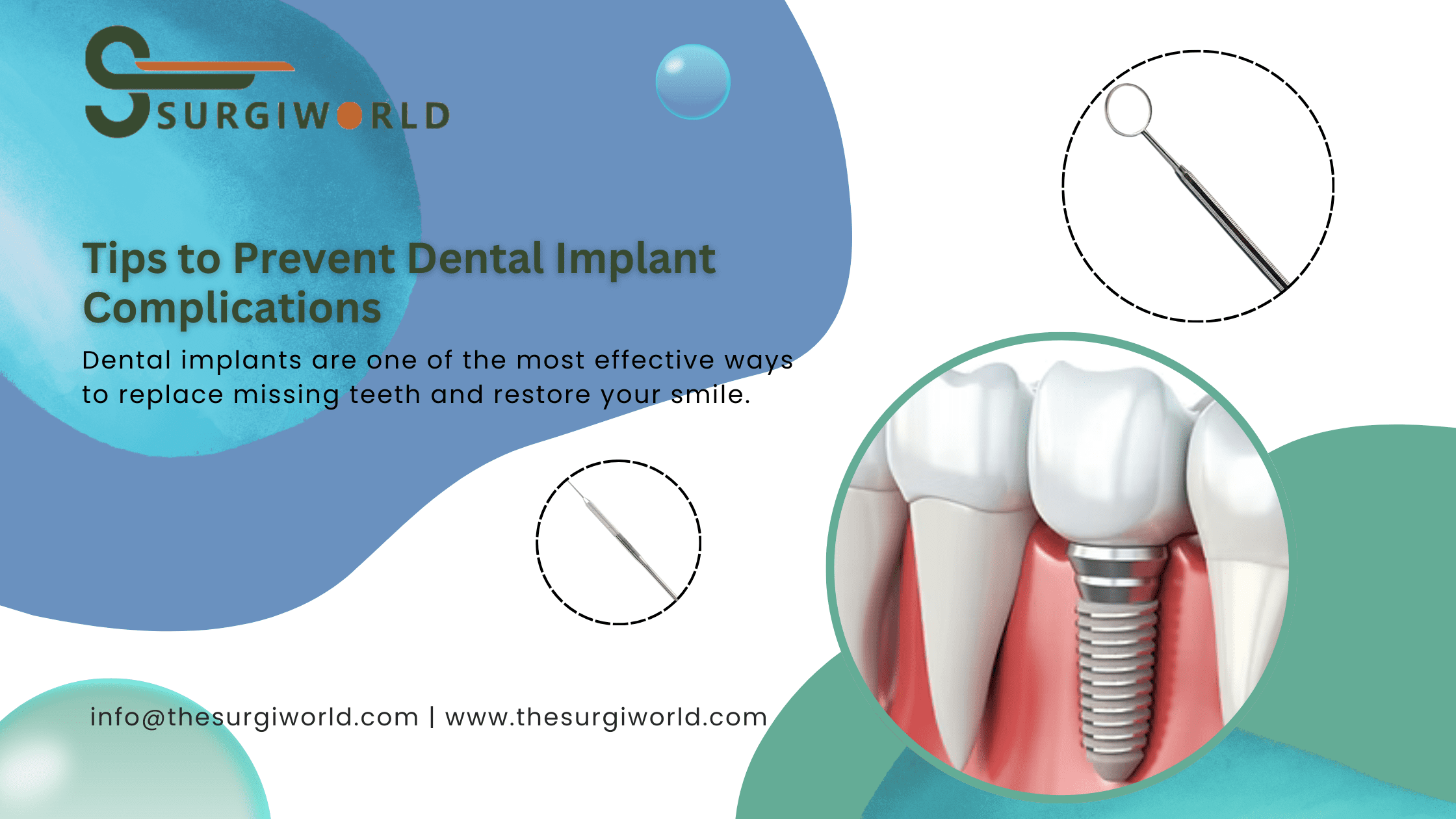
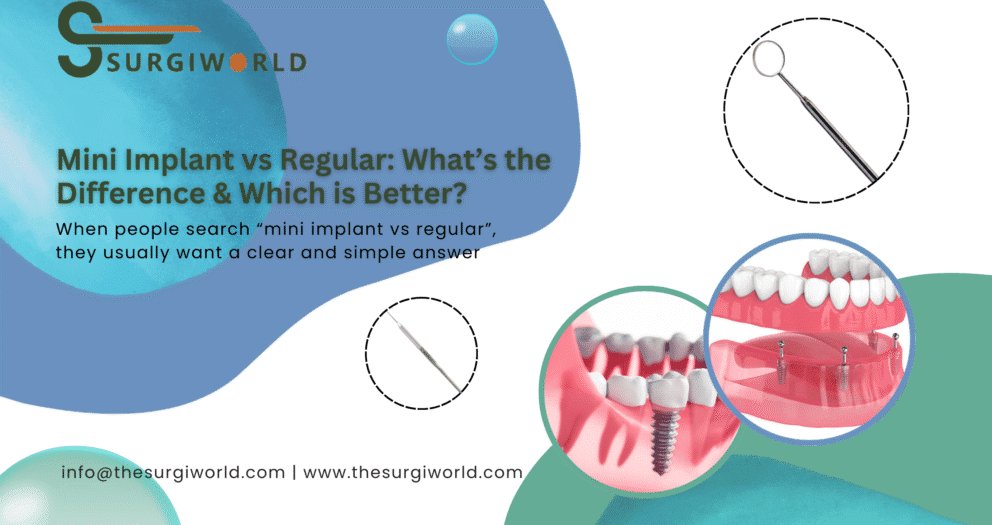
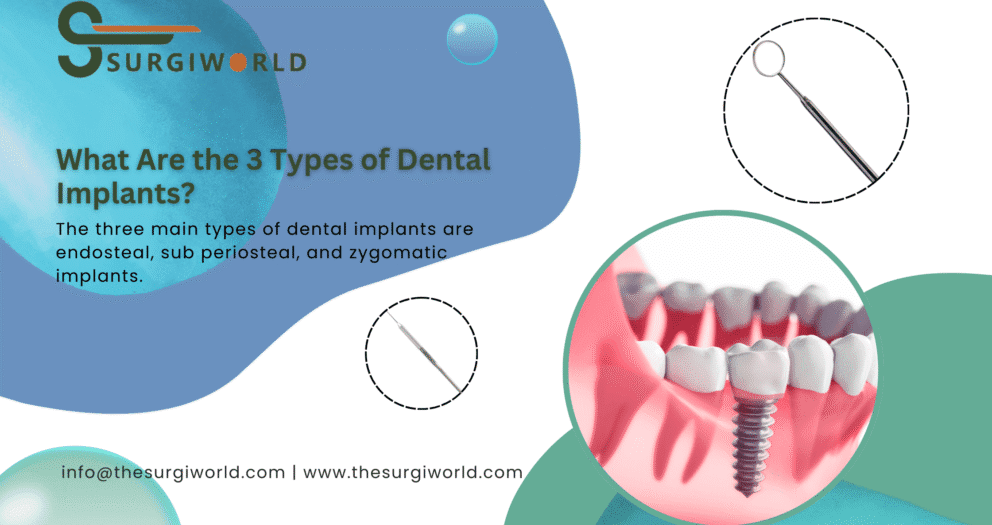
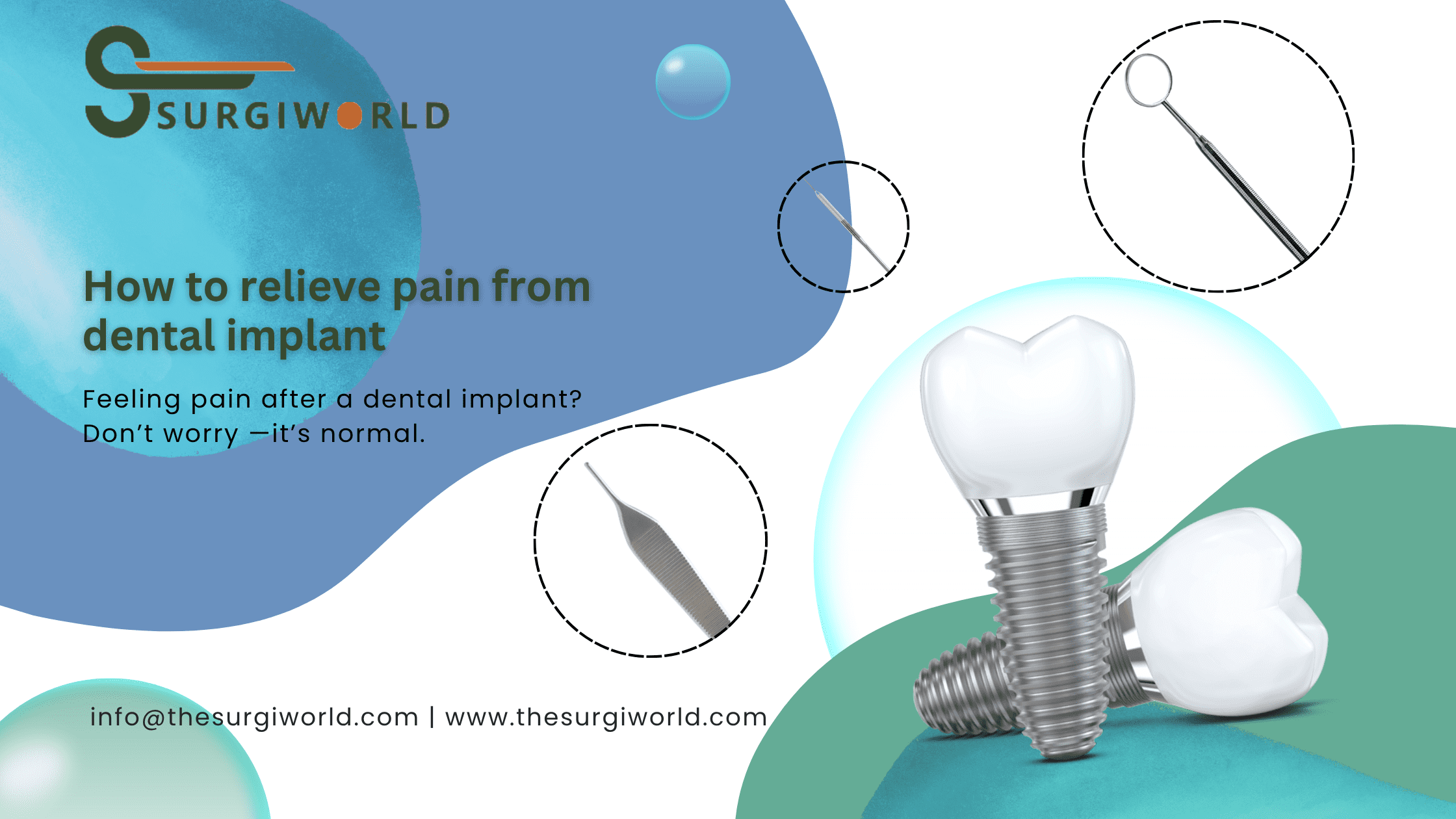
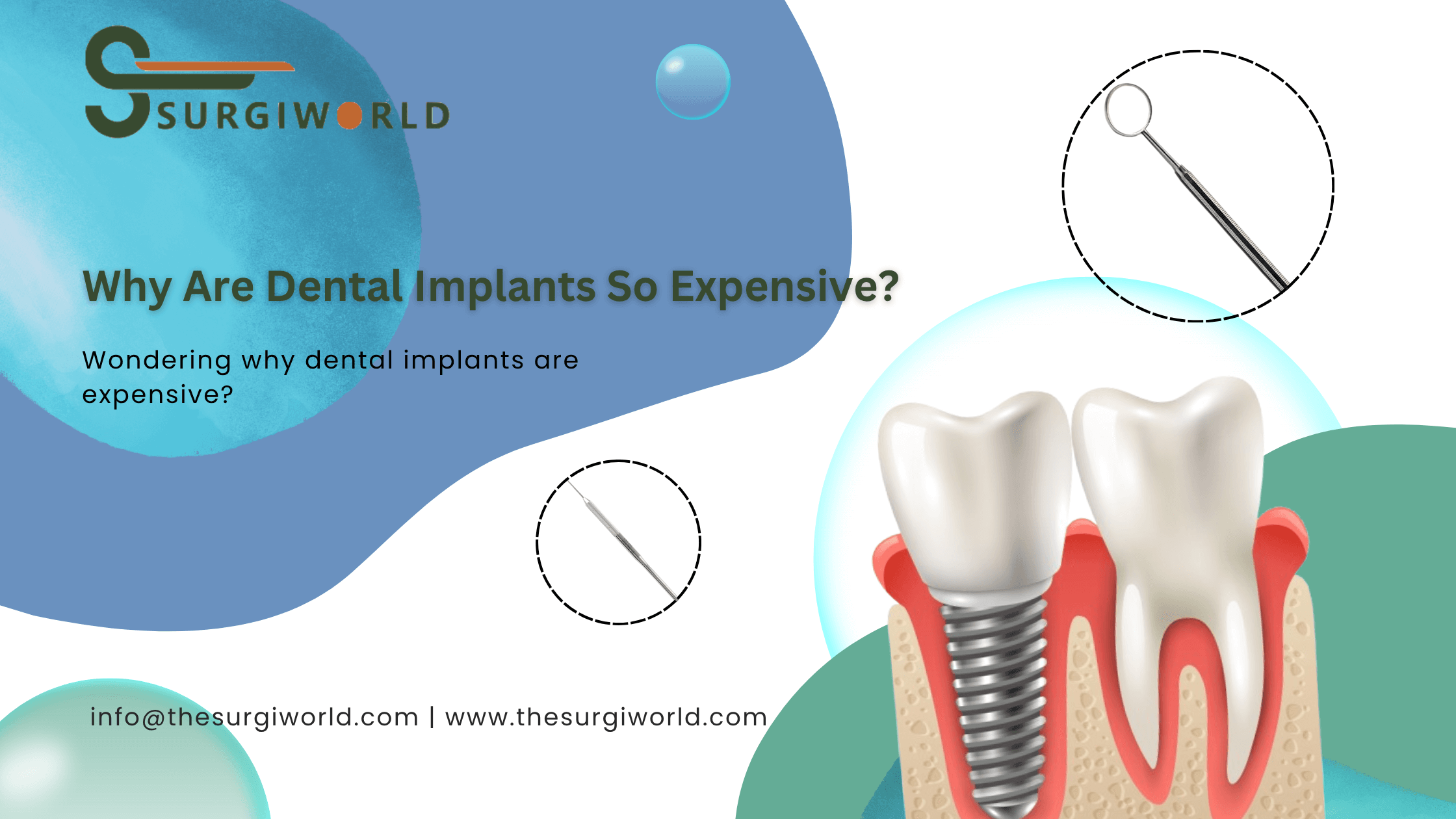

Write a comment
You must be logged in to post a comment.